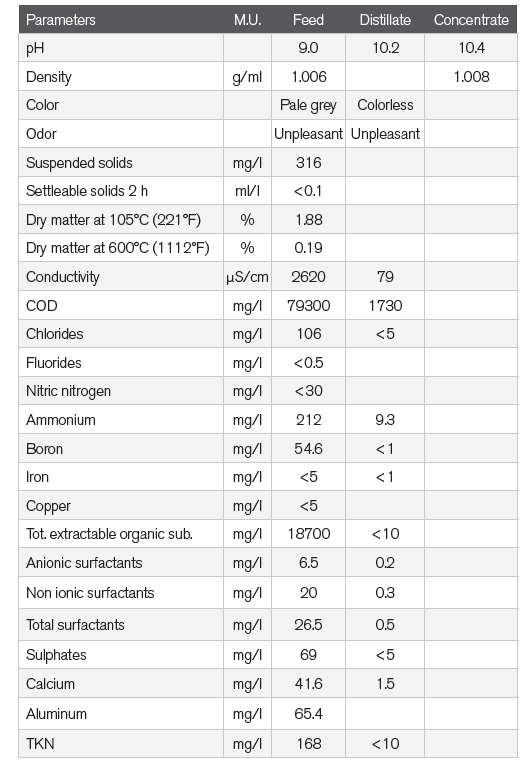Mechanical and surface treatment processes in the automotive, aviation, and appliances industries require large quantities of water and produce highly pollutant wastewater that cannot be discharged directly into the sewer without proper treatment. This requirement can easily increase a company’s operating costs. A feasibility study in each case for treatment of these wastes is recommended.
This study was used for analysis of oil emulsion containing coolant from machine tools and rinsing water of metal components from washing machines.
Results
In the laboratory evaporation test, a distillation yield of 90% was reached, meaning the waste was concentrated about 10 times. Normally, productivity will decrease according to the rise in boiling point. This value was strictly correlated to solution characteristics. The presence of volatile organic substances may involve the development of incondensable vapors that may cause problems to the vacuum system. During distillation, the liquid produced a considerable foam. It was necessary to check the foam to avoid dragging in distillate. At this yield, some fouling could appear inside the heat exchanger, so more frequent maintenance may be needed in order to maintain unit performance.
Materials
The waste was slightly alkaline and contained a small amount of chlorides. To guarantee good corrosion resistance, the austenitic steels of the AISI 316 series must be used for the parts of the unit that are exposed to the waste.
Evaporator Type
According to the analytical results of the supplied sample, viscosity of the solution under evaporation, the production of foam, boiling point rise, and the characteristics of the distillate correlated to the evaporation temperature- PRAB recommends using a forced circulation vacuum evaporator with a SHELL-AND-TUBE HEAT EXCHANGER, powered by a heat pump.
It is also possible to use other installation types (immersed coil heat exchanger or plate heat exchanger with a SCRAPING SYSTEM, etc.) powered by steam/hot water or by thermocompression.
These options require redefining the following parameters: variation of concentration factor, variation of man hours used for maintenance and plant stop, variation of operating costs, possible additional pre- or post-treatment of solution, and change in distillate characteristics.

To see if EVALED Vacuum Evaporation is the best option for treating your industrial water or wastewater, contact us today.